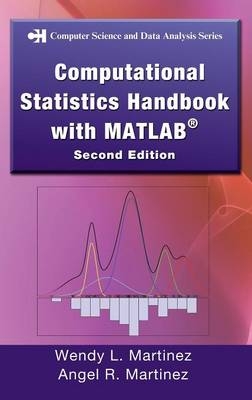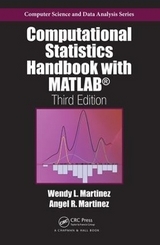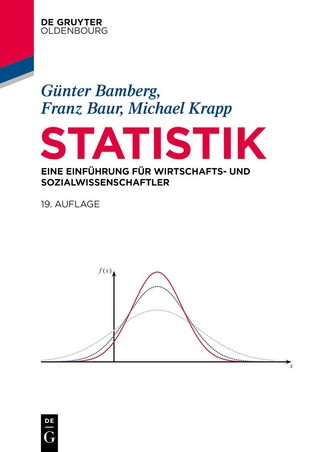
Computational Statistics Handbook with MATLAB, Second Edition
Chapman & Hall/CRC (Verlag)
978-1-58488-566-5 (ISBN)
- Titel erscheint in neuer Auflage
- Artikel merken
As with the bestselling first edition, Computational Statistics Handbook with MATLAB®, Second Edition covers some of the most commonly used contemporary techniques in computational statistics. With a strong, practical focus on implementing the methods, the authors include algorithmic descriptions of the procedures as well as examples that illustrate the use of the algorithms in data analysis. Updated for MATLAB® R2007a and the Statistics Toolbox, Version 6.0, this edition incorporates many additional computational statistics topics. New to the Second Edition
• New functions for multivariate normal and multivariate t distributions
• Updated information on the new MATLAB functionality for univariate and bivariate histograms, glyphs, and parallel coordinate plots
• New content on independent component analysis, nonlinear dimensionality reduction, and multidimensional scaling
• New topics on linear classifiers, quadratic classifiers, and voting methods, such as bagging, boosting, and random forests
• More methods for unsupervised learning, including model-based clustering and techniques for assessing the results of clustering
• A new chapter on parametric models that covers spline regression models, logistic regression, and generalized linear models
• Expanded information on smoothers, such as bin smoothing, running mean and line smoothers, and smoothing splines
With numerous problems and suggestions for further reading, this accessible text facilitates an understanding of computational statistics concepts and how they are employed in data analysis.
Prefaces
Introduction
What Is Computational Statistics?
An Overview of the Book
Probability Concepts
Introduction
Probability
Conditional Probability and Independence
Expectation
Common Distributions
Sampling Concepts
Introduction
Sampling Terminology and Concepts
Sampling Distributions
Parameter Estimation
Empirical Distribution Function
Generating Random Variables
Introduction
General Techniques for Generating Random Variables
Generating Continuous Random Variables
Generating Discrete Random Variables
Exploratory Data Analysis
Introduction
Exploring Univariate Data
Exploring Bivariate and Trivariate Data
Exploring Multidimensional Data
Finding Structure
Introduction
Projecting Data
Principal Component Analysis
Projection Pursuit EDA
Independent Component Analysis
Grand Tour
Nonlinear Dimensionality Reduction
Monte Carlo Methods for Inferential Statistics
Introduction
Classical Inferential Statistics
Monte Carlo Methods for Inferential Statistics
Bootstrap Methods
Data Partitioning
Introduction
Cross-Validation
Jackknife
Better Bootstrap Confidence Intervals
Jackknife-after-Bootstrap
Probability Density Estimation
Introduction
Histograms
Kernel Density Estimation
Finite Mixtures
Generating Random Variables
Supervised Learning
Introduction
Bayes’ Decision Theory
Evaluating the Classifier
Classification Trees
Combining Classifiers
Unsupervised Learning
Introduction
Measures of Distance
Hierarchical Clustering
K-Means Clustering
Model-Based Clustering
Assessing Cluster Results
Parametric Models
Introduction
Spline Regression Models
Logistic Regression
Generalized Linear Models
Nonparametric models
Introduction
Some Smoothing Methods
Kernel Methods
Smoothing Splines
Nonparametric Regression—Other Details
Regression Trees
Additive Models
Markov Chain Monte Carlo Methods
Introduction
Background
Metropolis–Hastings Algorithms
The Gibbs Sampler
Convergence Monitoring
Spatial Statistics
Introduction
Visualizing Spatial Point Processes
Exploring First-Order and Second-Order Properties
Modeling Spatial Point Processes
Simulating Spatial Point Processes
Appendix A: Introduction to Matlab
What Is MATLAB?
Getting Help in MATLAB
File and Workspace Management
Punctuation in MATLAB
Arithmetic Operators
Data Constructs in MATLAB
Script Files and Functions
Control Flow
Simple Plotting
Contact Information
Appendix B: Projection Pursuit Indexes
Indexes
MATLAB Source Code
Appendix C: Matlab Statistics Toolbox
Appendix D: Computational Statistics Toolbox
Appendix E: Exploratory Data Analysis Toolboxes
Introduction
EDA Toolbox
EDA GUI Toolbox
Appendix F: Data Sets
Appendix G: NOTATION
References
INDEX
MATLAB Code, Further Reading, and Exercises appear at the end of each chapter.
| Erscheint lt. Verlag | 20.12.2007 |
|---|---|
| Reihe/Serie | Chapman & Hall/CRC Computer Science & Data Analysis |
| Zusatzinfo | 200 equations; 56 Tables, black and white; 211 Illustrations, black and white |
| Sprache | englisch |
| Maße | 156 x 234 mm |
| Gewicht | 1247 g |
| Themenwelt | Mathematik / Informatik ► Mathematik ► Statistik |
| ISBN-10 | 1-58488-566-1 / 1584885661 |
| ISBN-13 | 978-1-58488-566-5 / 9781584885665 |
| Zustand | Neuware |
| Informationen gemäß Produktsicherheitsverordnung (GPSR) | |
| Haben Sie eine Frage zum Produkt? |
aus dem Bereich



